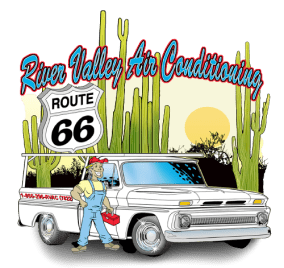River Valley Air Conditioning, Inc. understands the importance of both comfort and safety within your house. As seasoned experts in the HVAC space, we believe it’s our responsibility to provide you with the knowledge to safely operate and maintain your HVAC system — helping prevent accidents while guaranteeing efficient service.
No matter the source of your issues with your heating or air conditioning equipment, our safety tips have you covered. From understanding electrical safety precautions to understanding when to call in a professional service team — River Valley aims to give you peace of mind!
Electrical safety in HVAC systems
Even if they may not seem like it at first glance, HVACs are complex electrical appliances. Misuse can potentially cause injuries if you’re not careful.
Potential hazards and risks
If your system isn’t well looked after, it could lead to fires, electrocution or power surges, resulting in significant property damage, injuries, and even fatalities.
Safe handling practices
Always ensure your HVAC system is turned off at the breaker box before beginning any maintenance work. This reduces the risk of electrical shock.
Also, remember to wear safety equipment like gloves and safety glasses if needed. Complex fixes should always be left to a professional.
Proper grounding
Grounding your HVAC system is crucial. It helps prevent electrical shocks and protects the system from power surges. Always ensure that your heating and cooling system is installed and grounded by a professional to avoid any potential hazards.
Professional assistance
While homeowners can do minor maintenance, having a professional inspect your HVAC system regularly is always advised. Industry professionals have the tools and problem solving skills necessary to handle any potential electrical issues that are spotted, keeping you and your home safe.
Common HVAC hazards and risks – a detailed guide to prevention
Your HVAC system is only helpful when it’s not a hazard. Here’s a guide on some of the potential dangers and how to address them.
Refrigerant leaks
Refrigerant is an integral part of your HVAC system. However, it can be incredibly dangerous to your health and unit if it leaks out. It’s harmful to your skin and eyes, and can cause respiratory issues if you inhale it.
How to avoid it:
To avoid this risk, regular system checks by professionals are crucial. For example, the team at River Valley is always here to help ensure your system is leak-free and safe.
Carbon monoxide poisoning
HVAC systems, especially gas furnaces, can emit carbon monoxide gas — an odorless, colorless and potentially lethal gas — when they aren’t working properly. Some signs of CO poisoning include:
- Fatigue
- Headache and confusion
- Dizziness or light-headedness
- Nausea and or vomiting
- Chest pain and/or shortness of breath
- Loss of consciousness
If you notice any of these symptoms, get fresh air immediately and call a professional to come check your system and air quality.
How to avoid it:
Install a quality carbon monoxide detector and make sure to keep its batteries working.
Air quality issues
A poorly maintained HVAC system can circulate dust, allergens, and other particles in your home, affecting indoor air quality. Respiratory problems are a clear sign of air quality issues.
How to avoid it:
Replacing or cleaning filters and air ducts can significantly improve your home’s air quality.
Fire hazards
Inadequately maintained HVAC systems can become fire hazards. Excess dust, fault wiring and short-circuiting can trigger fires.
How to avoid it:
Homeowners can prevent this by ensuring regular, professional maintenance check-ups and by keeping your HVAC system clean and clear of debris.
Remember — you can avoid these hazards with proper care and maintenance. Contact our team anytime for professional assistance or advice — we’re here to help keep your HVAC system running safely and smoothly.
Proper handling of HVAC refrigerants
HVAC refrigerant is a dangerous chemical that should ideally only be left to the professionals.
There are a few different types of refrigerants, some of which have been phased out over the years. R-22 is a common refrigerant chemical in older systems; however, it’s being phased out due to its impact on the environment. On the other hand — R-410A is more environmentally friendly and commonly used in newer HVAC units.
Handling leaks
Refrigerant leaks can be harmful. If you suspect a leak, never attempt to fix it yourself. Exposure to refrigerants can cause damage to your eyes, skin and more. Leave this to the pros.
If you do have to handle it, always use protective gear such as safety glasses and gloves to avoid direct contact.
Proper disposal
Because they are so harmful, refrigerants should never be thrown away like an old Coke can. They are potent greenhouse gasses and can leach into the waterways/ecosystems. Always ensure they are recovered and recycled or safely disposed of by a certified professional.
Compliance with standards
Maintaining local and international standards when handling refrigerants is of utmost importance when managing them responsibly.
In the US, the Environmental Protection Agency has strict regulations in place for the recycling and disposal of refrigerants; learning these standards will help you avoid penalties and help protect our planet!
As always, it’s best to leave refrigerant leaks and handling to a professional with proper training and experience. Should you require any assistance, contact our team at River Valley – we’ll get the job done.
Importance of regular HVAC maintenance and inspections
Regular HVAC maintenance and inspections are the cornerstones of ensuring your system’s longevity, optimal performance, and safety. These routine check-ups predominantly serve three purposes:
- Prevent unexpected breakdowns: Regular inspections can identify potential problems before they escalate into major issues, keeping your system in working condition.
- Maximize efficiency: Routine maintenance keeps your HVAC system running at its best, reducing energy consumption and lowering your utility bills.
- Ensure safety: Maintenance check-ups help identify any safety concerns, such as leaks or faulty wiring, that could be dangerous if ignored.
A routine HVAC inspection typically involves the following steps:
- Visual inspection: To start, an HVAC technician will conduct a visual examination, looking for any obvious issues — such as wear and tear or leaks.
- Filter replacement: Filters will be inspected and replaced if needed. Maintained filters provide high air quality in your home and keep your HVAC unit running optimally.
- Cleaning: Your technician will clean your HVAC system to remove any gunk that could affect its efficiency.
- Lubrication of moving parts: Over time, your system’s internal components begin to dry. Lubricating moving parts reduces friction and helps the system operate smoothly — extending its lifespan.
- Thermostat check: Your technician will ensure the thermostat is operating correctly, maintaining the right temperature and comfort in your home.
- Vent and ductwork check: Ductwork and vent checks look for leaks or blockages that could impact the system’s efficiency and your home’s air quality.
Need assistance with your HVAC? Call River Valley!
Your HVAC system’s safety, efficiency, and longevity depend largely on regular maintenance and inspections. These practices not only ensure your comfort but can also help reduce your bills and protect the environment.
At River Valley Air Conditioning, we’ve been committed to helping homeowners with their HVAC needs for the past 50 years. Don’t take risks with your HVAC system — let us help provide you, the customer, a comfortable home for you and your loved ones. From installation to maintenance and repair, your safety, comfort and satisfaction are always our guarantee!
Contact us today and see how River Valley Air Conditioning can help!

